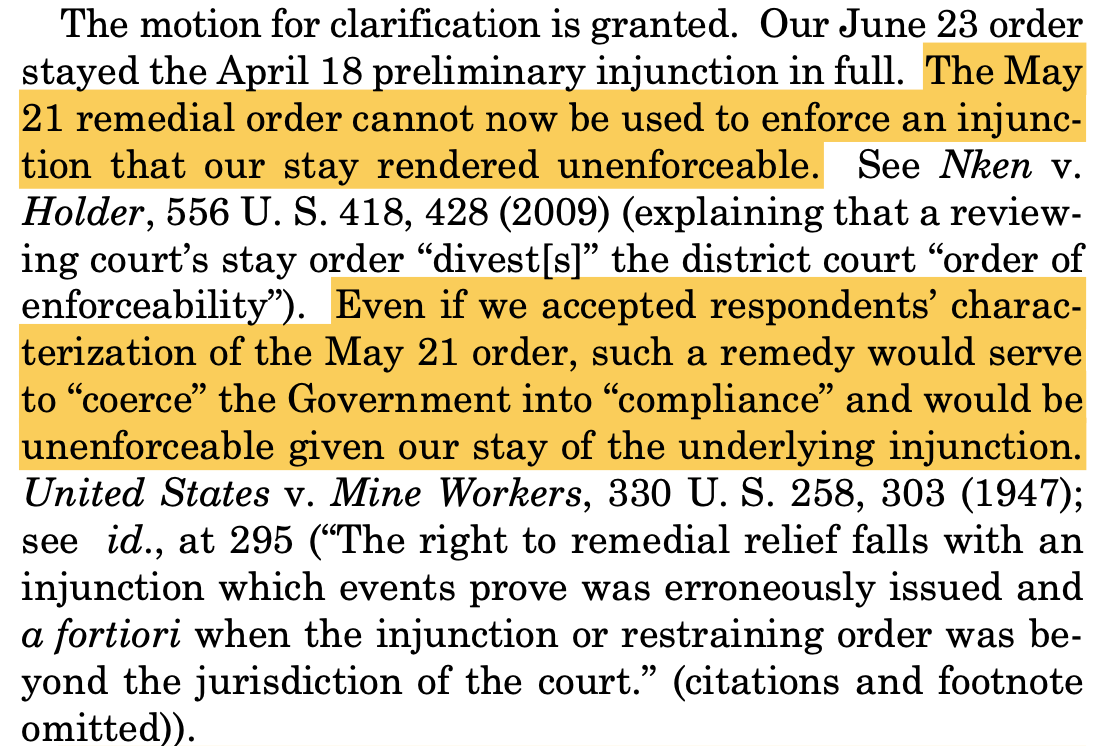SCOTUS allows Trump admin to send eight men to South Sudan with no process
Sotomayor, joined by Jackson, dissented, calling their colleagues' actions in the case "indefensible." It was one of several alarming signs for the nation on the Third of July.
The U.S. Supreme Court issued an order on Thursday that will empower the Trump administration to send people subject to deportation to countries they have no connection with that are so dangerous the Trump administration advises Americans not to travel there.
The case at issue involves eight men the Trump regime wants to send to South Sudan through a process called “third country removal,” meaning a country other than a person’s country of origin or another country where they have legal status.
The Supreme Court, on an apparent 7-2 vote, held that the district court hearing the case could not enforce its remedy order requiring that due process be provided to the eight men — who were sent out of the U.S. in violation of an injunction in the case — because the Supreme Court later stayed the underlying injunction.
The order led Justice Sonia Sotomayor, joined by Justice Ketanji Brown Jackson, to call their colleagues’ actions “indefensible.”
The men had been held in Djibouti at a U.S. military base since the district court had ordered the administration to stop its effort to send the men to South Sudan with no process.
It was not immediately clear what would happen now, but the implications were clear: Permission had been granted.
Because of that, Sotomayor, joined by Jackson, strongly condemned the court’s action Thursday.
“What the Government wants to do, concretely, is send the eight noncitizens it illegally removed from the United States from Djibouti to South Sudan, where they will be turned over to the local authorities without regard for the likelihood that they will face torture or death,” Sotomayor wrote in dissent.
What did the court do then, per Sotomayor?
“In the end, the majority ignores the Court’s Rules for seeking emergency relief and creates new law on civil contempt, all to allow the Government to circumvent the appellate process with respect to an order it continues to defy.”
Although Justice Elena Kagan had joined Sotomayor’s June 23 dissent when the court stayed the injunction, Kagan concurred with the Republican appointees on Thursday, writing, “I continue to believe that this Court should not have stayed the District Court’s April 18 order …. But a majority of this Court saw things differently, and I do not see how a district court can compel compliance with an order that this Court has stayed.“
In short, seven justices are allowing eight people to be sent to South Sudan.
As for the courts in America, Thursday’s decision cut back district courts’ authority even further beyond last week’s decision ending universal injunctions.
Finally, assessing the so-called separation of powers, Sotomayor wrote, “Today’s order clarifies only one thing: Other litigants must follow the rules, but the administration has the Supreme Court on speed dial.“
Thursday, in context
The order would be alarming on its own, but it is all the more so coming on Thursday, as congressional Republicans voted to pass a bill that will provide unprecedented funds to federal law enforcement even as it takes money — and health care — from those who most need it and saves the money of those who least need it.
It also came on the day that the Justice Department released, in response to a Freedom of Information Act request from Tony Tan, released the letters Attorney General Pam Bondi sent to Amazon, Apple, Google, Microsoft, and T-Mobile purporting to be "irrevocably relinquishing any claims" against the companies for violating the law that effectively banned TikTok in January.
Bondi's "reasoning," if you can call it that, is essentially the end of separation of powers. According to Bondi, Congress's determination in the TikTok-related law — signed by the president and upheld by SCOTUS — is meaningless if Trump says otherwise.
Bondi's letters — and the implications of them — are absurd or horrifying. There is no third option.
What's worse, with that in mind, is that the general counsels of some of the largest companies in the country got this letter and then the companies kept TikTok in their app stores. In other words, they decided this would do — despite the law to the contrary.
The treatment of the TikTok law might seem completely beside the point in the midst of everything else that is going on, but it is, effectively, a sign that the constitutional government we have operated under for more than 200 years is no longer in effect.
In the midst of all of that, the Supreme Court acted as it did to give the executive even more power on Thursday and to further limit the ability of district courts to do the job required of them in this moment.








We are firmly, irrevocably in George Orwell country now. First Citizen Trump orders the truly despicable … but who orders Trump? Delusional, yes; but also deluded too, I think. I’ll shut up now—South Sudan beckons.
Every day it's a new horror. And people are still buying into this regime's shit??
HOW is it that he has this level of support?